Table of Contents
Columbia University Press

New York
This book is dedicated to
Shalheveth Freier, who inspired it;
Yatza, whose legal ordeal was the impetus for it;
And two special womenmy mother, Adina, and my wife, Karen.
Our interest is in preventing Israels possession of nuclear weapons. But since we cannotand may not want to try [to]control the state of Israels nuclear program and since Israel may already have nuclear weapons, the one objective we might achieve is to persuade them to keep what they have secret. This would meet our objective because the international implications of an Israeli program are not triggered until it becomes public knowledge.
National Security Adviser Henry Kissinger, memo to President Richard Nixon, July 1969
Israelalong with her well-known friend the United Statessuffers from what looks to other countries in the region like hypocritical pretense, but the Israelis face great difficulties in the open recognition of reality. They have an elaborate pretense that they are reluctant to abandon. Many of them argue that a secret program gives less pain to their neighbors, and probably also do not wish to trouble any friend (especially in the United States) for whom a declared Israeli bomb would be embarrassing. Their pretense grows thinner as public debate about their nuclear capability becomes more candid. The number of those outside Israel who are comforted by the pretense shrinks, and the number who find it absurd and even offensive grow. The pretense [of amimut] prevents any public defense of the Israeli program by the Israeli government and any effective argument that no state or group need fear an Israeli bomb unless it attempts the destruction of Israel.
National Security Adviser McGeorge Bundy, chairman of the Joint Chiefs of Staff William J. Crowe, Jr., and Sidney D. Drell, Reducing the Nuclear Danger
Preface
I have written this book to encourage reflection and policy discussion on a subject rife with domestic, regional, and global implications, a subject that has been largely untouchable for decades: Israels bargain with the bomb (the meaning of this phrase is discussed in the introduction). In Israel, such a discussion is constrained by a societal taboolike prohibition enforced by strict state censorship encompassing all factual aspects of the subject. In Washington, however, the prohibition is more subtle and less absolute. Nevertheless, the American public does not know that American policymakers also adhere to their own code of silence on the subject. The Israeli bargain thus is also an American bargain.
A study of the Israeli bargain with the bomb is long overdue. My purpose in this book is threefold. First, I decode the politics, sociology, and psychology that set apart Israels bargain with the bomb from all other nuclear-armed states. We cannot appreciate the prohibition that sustains this bargain without understanding its underlying cultural and psychological layers. Second, I assess both the strategic achievements and the democratic shortcomings of the bargain. Third, I describe a new bargain framed primarily, but not exclusively, in domestic terms, and offer new thoughts about how Israel, with the help of other countries, especially the United States, can rewrite its bargain to better confront relevant domestic, regional, and global challenges.
This study views Israels nuclear history as closely related to deeper issues of national identity. The countrys nuclear arrangement is intertwined with indeed, it is the result ofdeeper identity issues. Israels nuclear uniqueness thus can be understood only by addressing identity issues.
There is a parallel between the Israeli bargain with the bomb and the larger Israeli-Zionist national project. The bargain could even be seen as a condensed version of that project. If the Israeli-Zionist national narrative is the path from Shoah (in Hebrew, Holocaust) to Tkumah (in Hebrew, national revival), the bomb is the result of the narratives most existential aspectsthe grounding, anchoring, and ensuringof that path.
The Israeli essayist Ari Shavit alluded to this when comparing the Israeli nuclear project and its productthe bombto a greenhouse that seals and shields Israel against external existential threats. Only when shielded by this glasslike greenhouse can the Zionist enterprise thrive in an hostile external environment. What Shavit meant is that the bomb is the embodiment of the vow Never Again; that is, the purpose of the bomb is to make sure that another Holocaust will not happen again to the Jewish people.
The analogy between Israels bargain with the bomb and the nations general condition goes deeper, as it also is a condensed version of the Zionist dialectics of exceptionalism and normalcy. The purpose of the Zionist project was to heal and normalize the Jewish condition by creating a Jewish nation-state, and the bomb is an anchor of that endeavor. But the Zionist project has not yet been fully realized, as Israel has yet to be accepted by its neighbors or to determine its own identity (e.g., by adopting a constitution). Likewise, Israels bargain with the bomb has not been granted legitimacy, either at home or abroad.
My book Israel and the Bomb (Columbia University Press, 1998) told the early political history (1948 to 1970) of the Israeli nuclear project from a historical and descriptive perspective. In it, I recounted the origins of the policy that guided Israels pursuit of nuclear ambitions during its formative days, a policy commonly referred to today as nuclear opacity or nuclear ambiguity (in Hebrew, the phrase is amimut ). This policy has allowed Israel to build formidable nuclear capabilities while minimizing tension with the rest of the world, especially with the United States, and also minimizing the incentive for others in the region to follow Israel in acquiring nuclear weapons.
Israel and the Bomb ended with the secret nuclear deal between President Richard Nixon and Prime Minister Golda Meir in September 1969, when the two leaders arrived at an unwritten understanding concerning Israel and its possession of nuclear weapons. This understanding opened the door for nuclear opacity, or amimut , as a code of conduct for the two countries on the nuclear issue.
Since then, amimut has become Israels original contribution to the nuclear age, a commitment that has been widely appreciated. Most nations view amimut as a helpful fiction that serves international security and stability. At home, amimut has extended beyond a governmental policy to become a sociocultural prohibition that is at the core of Israels national attitude toward the bomb.
The ending point of Israel and the Bomb is the starting point of this book. My central questions here are different: What enables the Israeli bargain with the bomb to endure, both domestically and internationally? Is Israels nuclear bargain compatible with its commitment to democracy? Has the nuclear bargain outlived its usefulness? Could Israel find a better way to meet the challenges of the early twenty-first century?
The prohibitions against discussing nuclear matters in Israel have eroded somewhat over the years, but amimut still serves a powerful sociopolitical function. Israel refuses to acknowledge its possession of nuclear weapons; Israeli publications are forbidden to refer directly to the nations nuclear weapons (publications may refer to them only by quoting foreign sources); and state organizations are officially committed to guarding and enforcing nuclear opacity.


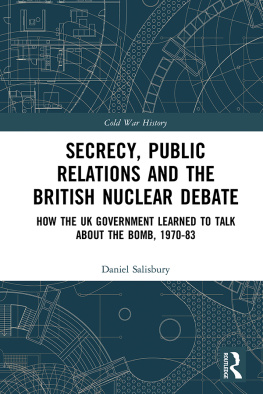
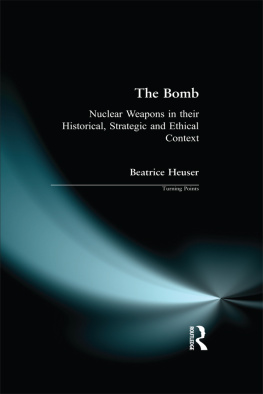
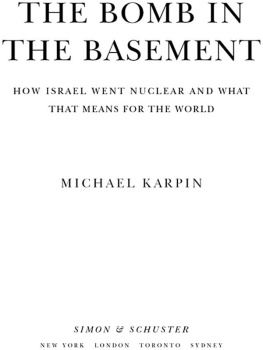
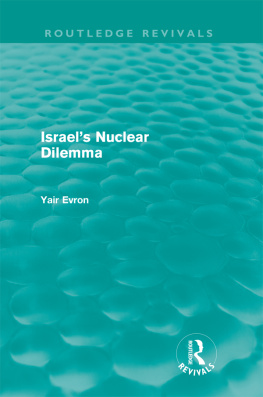
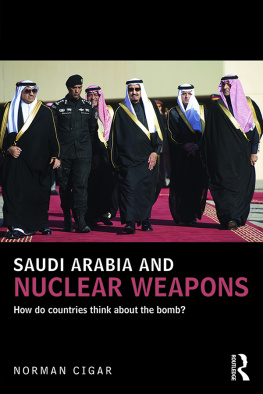
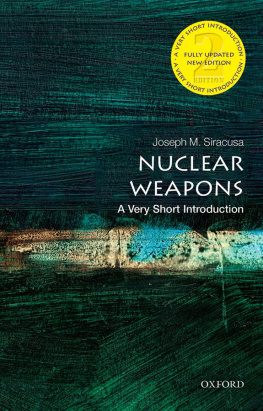
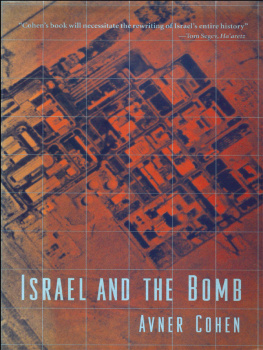
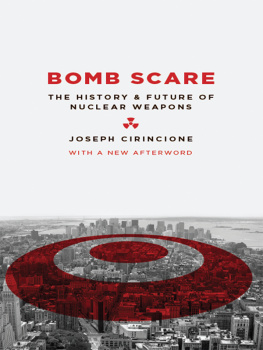

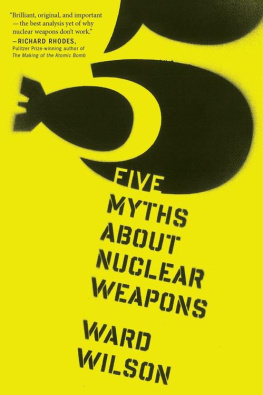
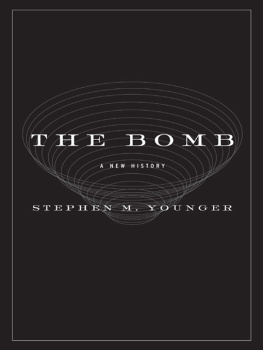


 New York
New York